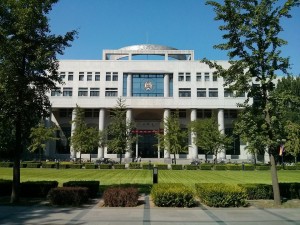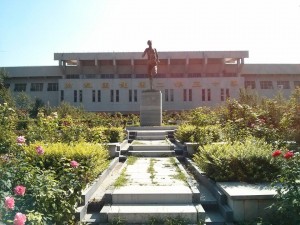Osgoode has an extensive list of partner schools with formal exchange agreements. Apart from these, there are summer programs, as well as semester exchanges with York University’s partner schools. But did you know that you can arrange your own exchange agreement with a non-partner institution? Of course it will take some leg-work, but the individualized and unique experience will be worth all the effort.

This week we travel to Beijing with JD/MBA ‘14 grad Martin Hui, who arranged a semester abroad with Tsinghua University’s School of Law. He was able to do so through approval of a Letter of Permission. Martin’s arrangement, as well as his existing interest for continued Osgoode-China involvement, led to talks between the two institutions which are now formalizing an exchange agreement between Osgoode and Tsinghua. The collaboration was made possible by the contributions of Professors Jinyan Li and Francois Tanguay-Renaud.
Osgoode students have a history of interest in exploring China. For instance, the Teach in China Program has sent two graduates to teach law at the Southwest University of Political Science and Law in Chongqing, Sichuan every year. The Hong Kong University exchange program has been an annual popular success among students, and now the Tsinghua exchange program is sure to appeal to many more students in the coming years.
For Martin, China was a top choice for a number of reasons. Firstly, his Chinese heritage gave him the desire to experience his parents’ motherland. In previous years, though he had visited China, his stays had never been long enough to truly be able to learn about his home country through immersive living. He comments that in Canada and the West, the realities of living in China are known only by second-hand information, and much of it remains a black box for most. However, as a rising economic superpower, the significance of seeing the true China has never been greater. This was exactly Martin’s biggest reason to go to China – to know the country, because if you’re not physically there, it is very hard to really know it.
Martin’s semester consisted of five classes on topics such as Chinese Constitutional law, intellectual property, civil Chinese society, and investment arbitration – but the range of available courses is wide, with lots of options. The benefit of taking these kinds of courses abroad in China was that they were taught in the Chinese context and aimed at dealing with Chinese clients; a very helpful perspective for those who wish to work with a largely Chinese demographic as a legal professional. As well, Mandarin language courses are offered, a prime opportunity to intensively learn and practice this widely-spoken tongue.
Apart from the academics, Martin recalls that some of his most memorable moments in China were while travelling through northern China and inner Mongolia. Seeing the natural beauty of the country was a true gift, especially in its high contrast to the Canadian outdoors that we are all used to. As well, Martin has family in Guangzhou; being able to visit them was another major highlight of the trip. He was also even able to visit the hotel where his grandparents were married, making up the most memorable moment of his months in China.
Not all aspects of a trip to a foreign country are ideal. Martin recalls how food quality and food handling practices were an issue for him throughout his stay; it is unfortunately true that sanitary standards in food service are different in China, and it is especially difficult for foreigners to adjust to such standards. Despite that, Martin recommends that when in China, you obviously cannot skip out on real, authentic dim-sum!
 Martin recommends that all students go on an exchange semester, as well as specifically to the new Tsinghua program. Or, like Martin, students can apply to arrange their own special semester with a non-partner institution through a Letter of Permission, perhaps with an institution that has a particular significance or personal connection. There is more information and guidance provided by the staff here at Osgoode, who will be sure to assist you in making it all possible.
Martin recommends that all students go on an exchange semester, as well as specifically to the new Tsinghua program. Or, like Martin, students can apply to arrange their own special semester with a non-partner institution through a Letter of Permission, perhaps with an institution that has a particular significance or personal connection. There is more information and guidance provided by the staff here at Osgoode, who will be sure to assist you in making it all possible.
Dean Sossin has also blogged about the exciting new exchange agreement with Tsinghua University’s School of Law, one of China’s leading law schools. He notes that this will not only give lasting learning experiences to the individual students attending the program, but will also foster both the Canada-China bond, as well as the greater Chinese-Canadian community. And as Dean Sossin puts it, “the future of Osgoode in China looks extraordinarily bright.”
